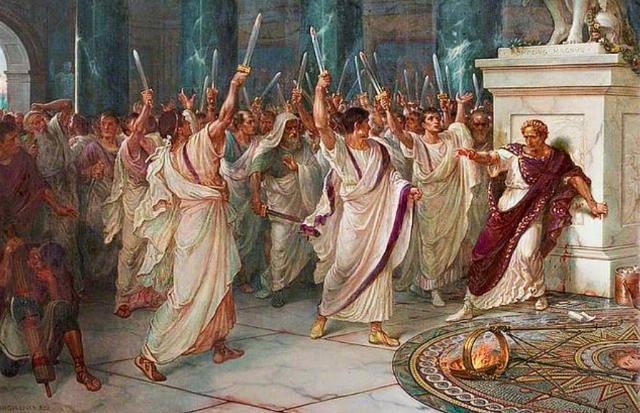How republics fall
It is a tale told and retold: A republic, and a people who could not keep it. From Philip II of Macedonia “ending Greek freedom” to Julius Caesar and the Roman Republic to Napoleon Bonaparte and the French Revolution, the popular narrative blames one ambitious man for “ending freedom.” Even Star Wars frames the fall of the Jedi and the Old Republic much the same way.
But did Caesar truly “end the Republic” or was the Republic already a corrupt morass before he ever crossed the Rubicon? To answer that, we must look at Rome in the late second and early first centuries BC. By then, the Republic stood at its height: Carthage defeated in the Second and Third Punic Wars; Greece subdued in the Macedonian Wars; Asia opened after Magnesia. Rome had become a three-continent superpower.
Success brought social distortion and chaos. Hundreds of thousands -- perhaps millions -- of slaves were imported into Italy by wealthy elites. This had a devastating economic effect on ordinary Romans: slaves were taking many of the lower-level jobs in Italy. Citizen Roman farmers were displaced by enormous latifundium, which was the ancient world equivalent of industrial farming. These latifundium were not farmed by peasant Roman citizens but primarily by slaves. As wealthy landowners (the Optimates) accumulated estates, citizen-farmers slid into destitution.
In many cases, the household slaves of the wealthiest Roman citizens had better living conditions than poor Roman citizens. Amid this chaos, two brothers attempted to reverse the slide. Tiberius and Gaius Gracchus, known as the “Gracchi brothers,” served as plebeian tribunes in 133 BC and 122-121 BC respectively. Both were killed -- political murder, one might fairly say -- when their efforts threatened the ruling class.
In short, the Roman Republic was not healthy when Julius Caesar was born in 100 BC. His youth played out amid the bloodletting of Marius (Populist) and Sulla (Optimate) -- rival power blocs weaponizing courts, proscriptions, and mobs. Elections were routinely manipulated; intimidation and patronage corrupted public life; “emergency measures” became habit rather than exception.
The parallels to modern America are not hard to see. This was the political world Caesar entered: a governing elite comfortable bending rules, importing waves of cheap labor, and off-loading the costs onto the working citizen.
In that light, the claim that “Caesar killed the Republic” rings hollow. Long before the Rubicon, the Optimates had hollowed out republican norms -- rigging contests, assassinating opponents, and treating citizens as expendable. Caesar was not the cause so much as the consequence: a populist, system-breaking response to elite corruption. It is no surprise that many of his fiercest aristocratic opponents -- Cato, Metellus Scipio -- and later assassins -- Brutus, Cassius -- cried the ancient equivalent of “our democracy!” even as their own faction had spent decades shredding it.
This is not a call to summon a modern Caesar. It is a reminder: republics rarely die because one man destroys them; they die because the class entrusted to steward them grows corrupt. Caesar could never have amassed his leverage had the Optimates not spent generations sawing through the legs of the constitutional order. Blaming him alone absolves the real arsonists.
President Trump is a mix of Caesar, the Gracchi Brothers, and Augustus. Like Caesar, he is addressing the corruption of the elite in our Republic. Unlike Caesar, President Trump has no serious ambitions of “becoming Emperor” or abolishing the Constitution (although he often trolls his opponents with “Trump 2028”). The American Republic can still be saved if reform beats decay. But if reformers fall -- like the Gracchi or Marius -- while the ruling class continues corrupt practices including election-rigging and labor manipulation, history suggests a Caesar will eventually emerge.
It’s comfortable to blame the man who points at the rot rather than those who caused it The people who bring down a republic rarely admit their role; they indict the whistleblower. Our Republic is not yet a rotting corpse, but it is on life support, and it was put there by the same corrupt elites who cry “our democracy” whenever their conduct is challenged.
If we are to keep the Republic, we must do two things. First, accept Jesus Christ as our Lord and Savior, as Charlie Kirk did. And second, do activism. Volunteer at your local county or state Republican party, knock on doors for local candidates, and vote in every election, not just for President. “A Republic, if you can keep it,” said Benjamin Franklin. The fate of the American Republic is not in any single leader’s hands. It’s in yours.

Image: William Holmes Sullivan